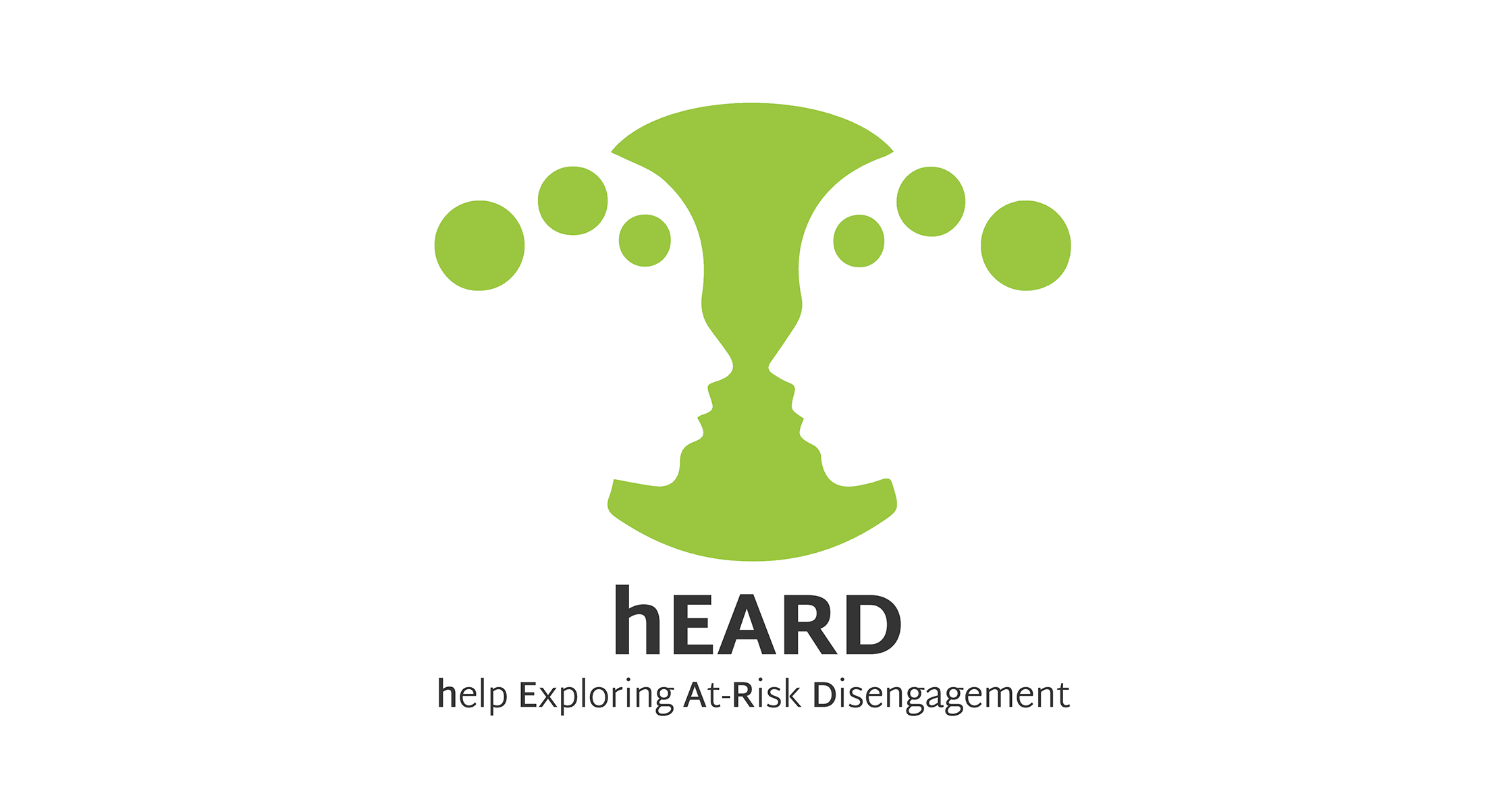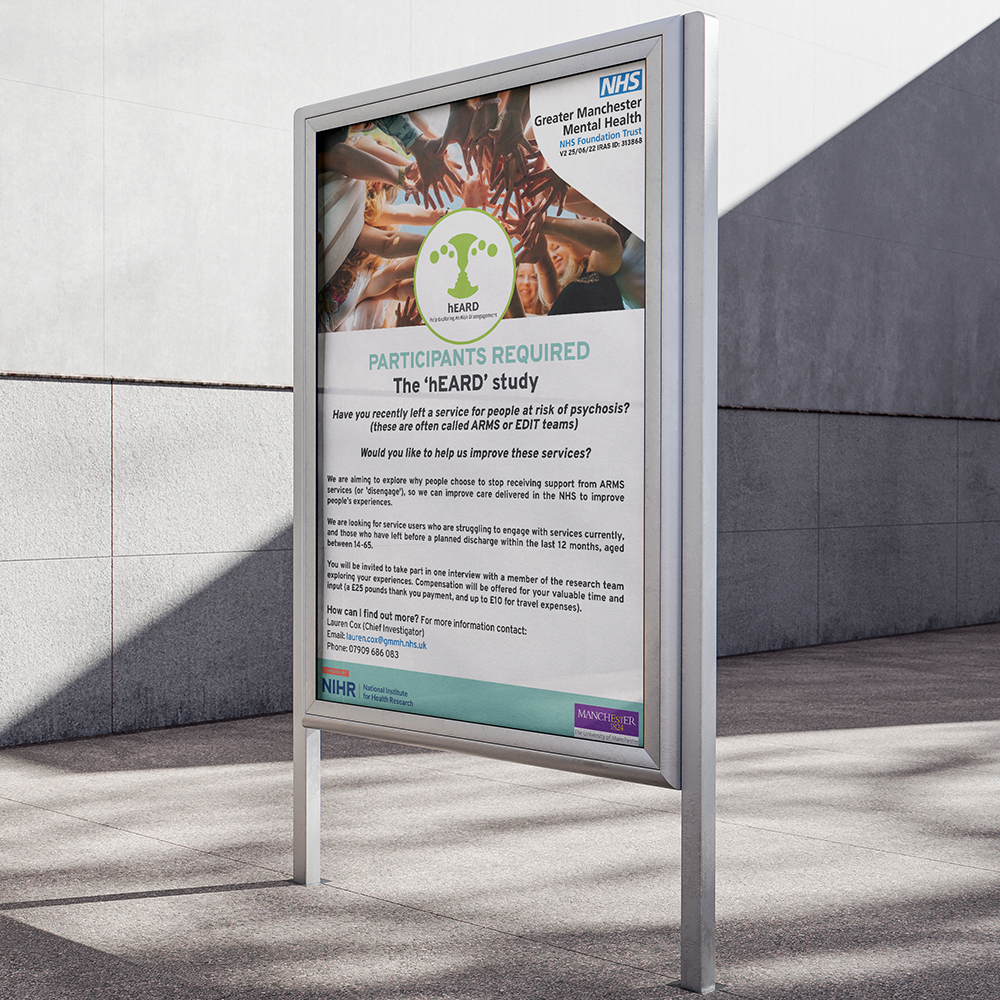hEARD

hEARD: Exploring and addressing At-Risk Mental State
Led by: Lauren Cox
What is hEARD?
hEARD is a set of studies funded by the NIHR and led by a personal clinical doctoral fellowship award with the aim of improving At-Risk Mental State services within the NHS in partnership with service users.
The study is divided into three phases: a systematic review of qualitative mental health disengagement studies, an interview study with ARMS users who have disengaged from support taking place across Manchester, Liverpool, The Midlands, and The North East, and a Delphi study. The study has already been set in motion, and recruitment to the second phase is currently open across the research sites.
The views expressed in this publication are those of the author(s) and not necessarily those of the NIHR.
Why is hEARD important?
NHS mental health services and treatments to prevent the onset of psychosis have been developed for those who might be at risk of psychosis, and these use the term ‘at risk mental state’ or ARMS. These services vary across the country, however usually involve the delivery of Cognitive Behavioural Therapy in order to manage experiences people might be struggling with (NICE 2014).
Despite these services existing, ARMS users may disengage from support. This may lead to negative outcomes such as developing psychosis or other mental health problems, and long term use of other mental health services, preventing full recovery.
There is a need to better understand disengagement from services among ‘at-risk’ individuals. Although previous research has suggested how to address barriers to receiving ARMS care, there are no studies which specifically explore disengagement and how to address this from a service-user perspective.
Existing pathways are based on research trials, neglecting ARMS voices in developing services in partnership with users. It is for this reason that hEARD is so important.
What are the aims of hEARD?
The aims of hEARD are to explore and understand why people choose to stop receiving support from ARMS services (or ‘disengage’), explore disengagement generally within mental health literature to build theory, and to understand the reasons for and impact of ARMS disengagement and people’s preferences on how we might address this.
We hope to address ARMS disengagement by developing a care model service-users value, which can be delivered in the NHS to improve peoples overall health and recovery outcomes.
What have public and patient advisors said about the research studies?
- Patient and public advisors who were previous ARMS users helped shape the research project from planning stages
- They described many issues preventing engagement, suggesting lots of areas to explore in interviews with ARMS users at phase two to make services more user-centred which will be explored across the project
- An Advisory Group continue to have input into the research to ensure studies are important from a consumer perspective
What is involved?
The interview study involves asking people about their experiences of leaving ARMS services, any impacts of this, and opinions of how services could be improved.
The Delphi study will have participants vote on priorities for ARMS services, taken from phases one and two of the research. This will be done online through survey rounds, in order to reach agreement on key parts of support required in services.
When is hEARD taking place?
hEARD is taking place across multiple sites, with recruitment for service user interviews open until July 2023. After this, recruitment for the Delphi study is planned to begin in July 2023.
What other work are we undertaking in hEARD?
In hEARD, we are undertaking a range of work to promote awareness and service improvements. This includes presenting research results at conferences and to commissioners, policy makers, service user groups, and NHS organisations.
We are also sharing our findings through social media, networking, academic journals, accessible blog posts, and animations, all with the help of patient advisors to ensure the information is presented in inclusive formats.
What is the end goal?
The user-centred care model will be ready to test in practice alongside current ARMS service provisions. We plan to apply for further research funding to ensure this is feasible to support teams to implement recommendations from the research.
More information:
If you are interested in finding out more get in touch with the research team…
Lauren Cox –Chief Investigator
Emma DePaola –Clinical Research Practitioner
emma.depaola@gmmh.nhs.uk
Download Resources Here...





